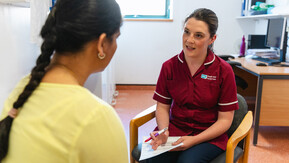
Rehab for colorectal cancer
Blog
Published:
12 October 2021
In this blog Alice Finch talks us through how the London North West NHS University Healthcare Trust (LWNH) worked to improve their rehabilitation services for cancer patients.
The initiative
This initiative was set up to:
Complex colorectal cancer patients have massive surgeries. This can involve the total removal of bladder, bowel and anus. Therefore there is a clear need for prehabilitation before surgery to optimise recovery from such a massive trauma to the body.
- look at the impact of prehabilitation and increased postoperative physiotherapy on complex colorectal cancer outcomes in patients.
Patients have chemotherapy and radiotherapy before surgery, so doing prehab during this time and when patients are waiting for surgery is so important.
What we did
- Macmillan funded a band 6 physio and band 4 physio assistant to set up virtual physio appointments (3 on average) before surgery. Sessions were virtual due to coronavirus and because patients were widely spread geographically.
- Patients were assessed on functional outcome measures which included fitness, nutritional health and a quality of life questionnaire.
- Patients were given a mixture of aerobic and resistance training exercises to help get them as fit as possible. Progress was reviewed at fortnightly intervals and exercises were adapted where needed.
- A follow up service was provided at 6 and 12 weeks post discharge. These appointments could help with specific queries, for example, how to prepare for starting to run again with a stoma.
Impact and outcomes
Average reduction of length of stay in hospital to 11 days
- The initiative allowed 7 sessions a week instead of the typical 3.
- More interventions could be carried out as there were just 2 members of staff.
- Pre-operative outcomes found significant improvements across the board.
- St. Mark’s Hospital and LWNH have now secured recurring funding for a ‘high-risk peri-operative clinic’. This consists of anaesthetists, physiotherapists, pharmacists and dieticians for an MDT approach to ‘prehab’.
- Average reduction of length of stay in hospital to 11 days. This would save around £140-170k a year on bed days.
- Patients gave very positive feedback and said the service is invaluable and helped them be prepared for surgery and recovery.
- The initiative is inspiring for other young physiotherapists at lower bands and shows that they don’t have to wait to become involved in research to do this type of work.
Future aims
- The initiative has the support of the National Institute for Health and Care Research (NIHR) and the Royal College of Anaesthetists (RCoaA). The ambition is to repeat the model using staff already in place.
- The aim is that in the next 10 years, multi-diciplinary prehabilitation programmes will be commonplace everywhere as a standard part of cancer treatment.
Find out more
You can contact the team by emailing Alice Finch at alice.finch1@nhs.net.
You can find Alice on X @alicept3.
We have more information about allied healthcare professional initiatives.
Supporting your role
We support Allied Health Professionals in their roles.
You may find the following resources useful:
Additional resources can be found in our news and resources section.
Stories And Media
-
Blogs 04 Jun 2025A practical guide for healthcare professionals on understanding and supporting the diverse spiritual needs of cancer patients to enhance holistic, patient-centred care.
-
Blogs 25 Mar 2024In the final instalment of this series, Chief Nursing Officer Dr Claire Taylor MBE and Macmillan Lead Cancer Nurse Fungi Motsi, discuss the challenges and experiences for women in leadership in...




